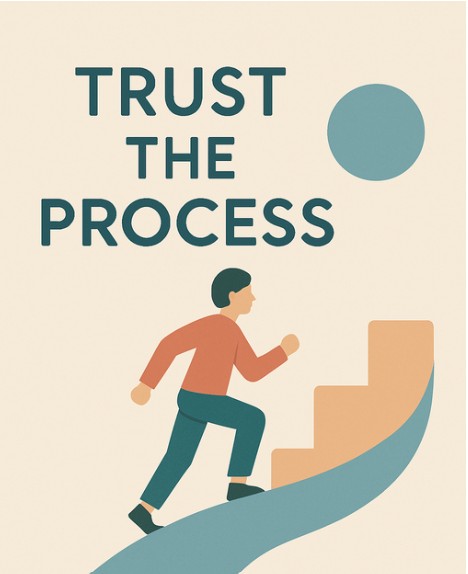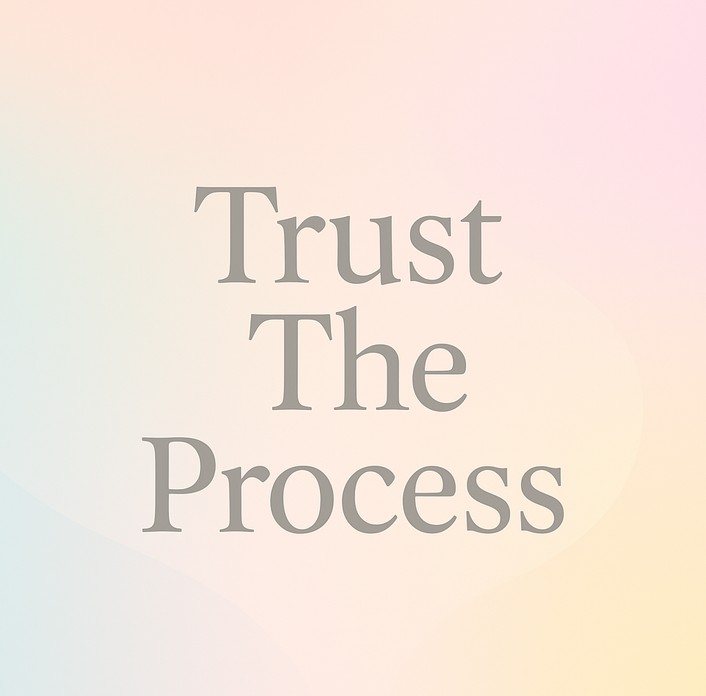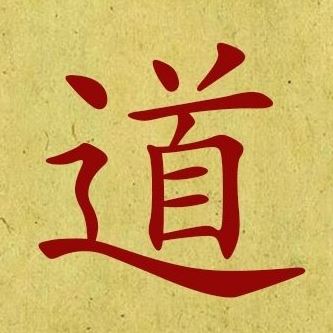Trust The Process
Beyond The Cliche

Why Should I Trust The Process?
The phrase "trust the process" has become a cliche, the woo-woo mantra of the "self help" industry.
Those three little words feel like they ought to mean something useful but hidden behind them are a number of assumptions that prompt important questions:
- Who should I trust?
- Why should I trust this person or this source of information?
- On what basis should I trust?
- What is this process I am to trust?
- Whose process is this?
- How was this process defined and established?
- What's the evidence that this process isn't just wishful thinking and it really works?
Trusting the process is situation specific.
There are two components to this:
[1] The credibility of the person who is telling you to trust:
- Can I believe this person?
- Are they speaking the truth based on their own experience?
[2] The credibility of the process you are being told to trust:
- Can I believe that if I follow this process I will get the outcomes that I am seeking?
- Is there a proven cause-and-effect relationship between the recommended actions that constitute this process and the declared outcomes that will result from those actions?
What It Means To Trust The Process

The 3 Mindsets
You have found someone you trust, someone who meets the criteria I outlined above.
There is a recommended process that you are going to trust, and you are going to stick with it.
Here are three mindsets that will help you to trust the process that you are committing to:
[1] Letting Go Of Control
There is a saying in the Tao Te Ching [sutra 22] that says:
"If you want to be given everything, give everything up."
This little aphorism carries a lot of weight.
The desire for control is an ego thing.
On the one hand your
ego is essential and does a wonderful job of running things for you and
marshalling your mental and emotional resources to work for you.
But it has one big fatal flaw, it creates and sustains two major delusions: firstly that it is who you really are - and secondly that it is in control of your life.
The effect of this is that you naturally gravitate to the tangible things that you can see easily and think you can control.
But life is complex and there are many situations where you just can't force an outcome, and the process requires you to shift your focus to the intangible areas where, over time, you may have influence.
However, there will often be times when you need to just surrender to the steps you're taking by consciously setting aside your preferred outcome or goal - or indeed any outcome or goal - and just focusing on the processes involved in the task in hand.
Non-Attached Mind - does not seek to gain anything
[2] Having Patience During The Gestation Period
Progress is often invisible.
It can feel like watching grass grow!
Life works in cycles and that does involve waiting, in other words, a gestation period.
Given that it can take months and often years for your goals to come to fruition, persistence - coupled with consistence - is everything.
Then there are the hold ups, blockages and setbacks. There is much "trial and error", this is period of deep learning, development and putting down deep roots.
This is a time of transition and it can often feel like you are stuck in limbo, but even though you can not see it nor do you know when it will happen,the gestation period will end with the creation and birth of your long cherished goal.
You can think of this as a "moment of alignment for action" - an opportune or decisive moment, a time when conditions are right and circumstances align for a decisive action or a significant event.
The Seasonality of Time And The Gestation Period
[3] Staying Present
We are brought up to believe that we get what we want in life as a
result of what we do, by the actions that we take.
Most of our actions are born out of fear, worry or doubt
The issue that we all face is that we are obsessed with doing, and that inevitably involves some form of struggle.
Those of us from a western influenced background are culturally conditioned to an action orientation, and thus we automatically place a great value on activity.
We truly believe that nothing will happen unless we do something. So we end up attempting to force our intentions and desires into manifestation by our actions.
Rather than obsessing over where you are - not yet, focus on fully engaging with where you are - right now.
Use the energy that drives you into the search in the future to drive you deeper into the present moment – use that energy to embrace the present moment:
To trust the process is like watching a river flow. You don't need to push the water forward. You simply participate, moment by moment, with what is unfolding.
Flowing Mind - Fully Present and Aware Whilst Taking Action
4 Practical Tips
So much of the online material on this subject is, in my view, light weight and "fluffy".
I guess this OK if its about ordinary day-to-day things like learning to bake a cake or learning to play the guitar or learning to drive a car.
What I am seeking to address in this article are situations where:
- you put everything on the line
- you have serious "skin in the game"
- you are "playing the long game"
In short, situations of high-risk/high-gain scenarios that are life changing.
That said, I now want to share some practical tips to help you stick with the process.
These tips are based on my experience in business over the past 40 years, and my experience in developing and working with the thinking skills and mindfulness practices that I have shared on Zen-Tools over the past 15 years. In summary:
- FOCUS - Focus on the process and not on the outcome that you working towards.
- MEASUREMENT - Pay attention to what you measure. You will eventuallly get what want if you measure what you value.
- APPEARANCES - Prioritise long term outcomes over short-term optics. Accept that you are going to look stupid.
- THE COST - Be prepared to pay the price. Trusting the process will lead you through a transition that involves training and testing.
1. FOCUS - Focus On Process Not Outcome
We live in a world dominated by social media that focuses on results and especially on big success, but it overlooks the process.
We live in a world that glorifies the results and not the process.
We see the knockout punch, we hear the hit song, we enjoy the dramatic performance but not the years of effort that went into perfecting it.
We see results but not the hard work.
The only way you can be far above average is to find a way to do the same thing over and over again.
This is hard, it will make you sweat, it may make you cry.
In archery, if you put intensity, focus and sincerity into the process—where you place our feet, how you hold the bow, how you breathe during the release of the arrow - then hitting the bullseye is simply a side effect.
As James Clear puts it:
"The point is not to worry about hitting the target.
The only way to become excellent is to be endlessly fascinated by doing the same thing over and over. You have to fall in love with the boredom of doing the work and embrace each piece of the process.
The point is to take that moment of complete awareness and focus, and carry it with you everywhere in life."
2. MEASUREMENT - Know What To Measure
We live in an age driven by data and metrics. The old adage "what gets measured gets managed" has never been more pertinent.
The metrics we choose to focus on can significantly shape our outcomes, sometimes in ways we don't intend.
We are hardwired to measure our progress in any and all areas of life where we have goals and aspirations. We can't not do it.
The emotional logic for measuring things is that it gives us a feeling of being in control and reduces the feeling of uncertainty [or we like to think it does].
But what we measure, and how we measure it, is important. It is even more important to measure the right thing.
Our default progress measurement setting is a forward measurement and this leads to self sabotage and results in deep unhappiness and dissatisfaction with our lives.
A forward measurement measures the distance between where we are now and where we think we want to be - which is always an ideal goal and by its very nature is always a moving target that remains out of reach.
Instead I recommend that you:
# Focus on The Gain
Shift your focus away from the gap - between where you are now and where to want to be - to the gain. Apply a backwards measurement of your progress to date on where you have come from.
# Measure The Small Steps In The Process
Without measurement of your daily activity in following the process you have no feedback. For example: you can’t predict when you find love, but you can pay attention to how many times you introduce yourself to someone new.
3. APPEARANCES - Outcomes Over Optics
In today’s fast-paced, hyper-connected world, the temptation to focus on optics - how things appear - is greater than ever.
While optics can provide short-term benefits, such as boosting your personal reputation, relying solely on them can lead to a hollow foundation and a lack of genuine progress, and yet this is the option we usually take as we are hard-wired to follow the line of least resistance and to follow the herd.
The personal benefit of optics is expressed in terms of intangible factors usually associated with ego, vanity and greed.
The personal cost of prioritising optics is not always immediately apparent but is often high, and frequently higher than we initially realise over the long term, and it is ultimately expressed as a tangible financial cost.
In contrast, the ultimate example of a focus on outcome over optics occurs when you are playing the long game and you really do have to trust the process.
When you play the long game you delay gratification now to get more later, you stop focusing on the short term and you think ahead.
The immediate effect of this is that you will be less efficient in the short term in order to be much more effective in the long term.
This can be hard and it means being prepared to make a lot of mistakes and errors and on occasions being prepared to look stupid.
4. THE COST - Be Prepared To Pay The Price
If you are pursuing a high value long term objective I can promise you with great certainty that as you trust the process you will experience a number of situational changes - in fact they will most likely be imposed upon you.
You will underdo an internal process of transition that you have to go through as you make your readjustment and realignment to the new realities.
I am going to be blunt, to really trust the process in the pursuit of a significant and high value objective will cost you heavily.
Trust will take you through a process of transition that will test you severely. It will break you or make you.
Hear what British explorer, adventurer and presenter Bear Grylls has to say on this subject:
“I will never forget the day I finally passed SAS
selection. At the end of the long, grueling process of elimination,
where 140 recruits had steadily been whittled down to only four of us, I
finally found myself preparing to get ‘badged.’
Yet it was the
most low-key event you could ever imagine. No fanfare, no bugler, no
parade. Just the four of us that remained, standing in a small,
nondescript outbuilding on the edge of the Hereford training camp; we
were battered, exhausted, bruised and spent, yet our hearts were
bursting with pride.
The commanding officer of the regiment walked in, stood in front of us and said these words - I have never forgotten them:
'From
this day on, you are part of a family. I know what you have had to give
to earn the right to be here. The difference between the four of you
and the rest of those who have failed is very simple: it is the ability
to give that little bit extra when it hurts. You see, the difference
between ordinary and extraordinary is often just that little word
extra.'"
Return from: "Trust The Process" to: Walking The Talk
Next Article:
The Dopamine Delusion - Why Anticipation Beats Achievement
LATEST ARTICLES
The Inner Weight of Shame - Sustained By Attentional Fixation
 A Mind That Is Continuously Engaged In Self-Surveillance. Shame is one of the heaviest inner burdens a human being can carry. It does not announce itself loudly or demand attention through drama. Inst…
A Mind That Is Continuously Engaged In Self-Surveillance. Shame is one of the heaviest inner burdens a human being can carry. It does not announce itself loudly or demand attention through drama. Inst…Does Prayer Work? The Psychology of Prayer, Meditation and Outcomes
 Reality Is A Complex System Of Countless Interactions - Including Yours. So does prayer work? The problem is that the question itself is usually framed in a way that guarantees confusion. We tend to a…
Reality Is A Complex System Of Countless Interactions - Including Yours. So does prayer work? The problem is that the question itself is usually framed in a way that guarantees confusion. We tend to a…Living in Survival Mode Without Surrendering Mental Authority
Living in Survival Mode Without Surrendering Mental Authority
 Clear Thinking When You’re Just Trying to Stay Afloat. Many people today are overwhelmed because they are living in survival mode - not temporarily, but as a persistent condition of life. For many, th…
Clear Thinking When You’re Just Trying to Stay Afloat. Many people today are overwhelmed because they are living in survival mode - not temporarily, but as a persistent condition of life. For many, th…Manifestation Without Magic: A Practical Model
 Manifestation without magic is not a softer or more intellectual version of popular manifestation culture. It is a different model altogether. Popular manifestation teachings tend to frame reality as…
Manifestation without magic is not a softer or more intellectual version of popular manifestation culture. It is a different model altogether. Popular manifestation teachings tend to frame reality as…Staying Committed When You Can't See Progress - The Psychology of Grit
 Uncertainty Is Not The Absence Of Progress, Only The Absence Of Reassurance. One of the most destabilising experiences in modern life is not failure, but uncertainty and staying committed when you can…
Uncertainty Is Not The Absence Of Progress, Only The Absence Of Reassurance. One of the most destabilising experiences in modern life is not failure, but uncertainty and staying committed when you can…The Battle For Your Mind - How To Win Inner Freedom In A Digital Age Of Distraction
 From External Events to Inner Events. We often think of “events” as things that happen out there: the traffic jam, the rude comment, the delayed email reply. But what truly shapes our experience is wh…
From External Events to Inner Events. We often think of “events” as things that happen out there: the traffic jam, the rude comment, the delayed email reply. But what truly shapes our experience is wh…How to See Your Thoughts Without Becoming the Story
 A Practical Guide to Thought-Awareness. You can spend your life inside the stories of your mind without ever learning how to see your thoughts clearly and objectively. Most of the stuff we tell oursel…
A Practical Guide to Thought-Awareness. You can spend your life inside the stories of your mind without ever learning how to see your thoughts clearly and objectively. Most of the stuff we tell oursel…The Collison Decision Matrix - A Simple Framework for Better Choices
 The Collison Decision Matrix Is A Practical Everyday Thinking Tool. Most of us spend a surprising amount of time worrying about decisions. From small ones such as what to wear, what to eat, what to te…
The Collison Decision Matrix Is A Practical Everyday Thinking Tool. Most of us spend a surprising amount of time worrying about decisions. From small ones such as what to wear, what to eat, what to te…The Power Of Asking The Right Question
 The Power Of Asking The Right Question Lies In The Quest For Insight. To experience the power of asking the right question you must develop the practice of asking questions. The best way to improve th…
The Power Of Asking The Right Question Lies In The Quest For Insight. To experience the power of asking the right question you must develop the practice of asking questions. The best way to improve th…Site Pathways
 Here is a site pathway to help new readers of Zen-Tools navigate the material on this site. Each pathway is based around one of the many key themes covered on this site and contain a 150 word introduc…
Here is a site pathway to help new readers of Zen-Tools navigate the material on this site. Each pathway is based around one of the many key themes covered on this site and contain a 150 word introduc…How To Live With Contradiction - Beyond Thought Let Stillness Speak
 A major impact on so many peoples' lives is the situational contradiction of unfilled realistic expectations. So where does all this leave us? Well here we are, with mental equipment that is more lim…
A major impact on so many peoples' lives is the situational contradiction of unfilled realistic expectations. So where does all this leave us? Well here we are, with mental equipment that is more lim…






